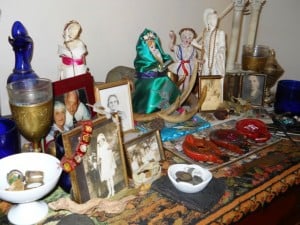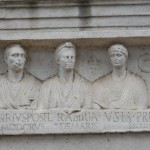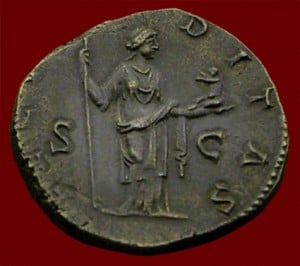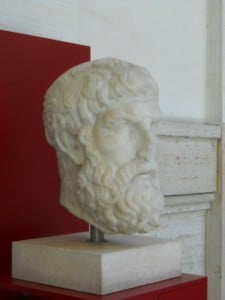Discussion of the religio Romana today usually centers on matters of a superficial importance. Topics of discussion concern poetic myths and philosophical speculations on the nature of the Gods, calendars of festival days, the priesthoods of ancient Rome, the little that is known about rites once performed for the Gods, and those few details of Roman practice that we might possibly recover today. Roman authors were not writing for modern reconstructions, of course, so they did not have to explain all the details of their practices, which varied considerably anyway. When a Roman said sacrum other Romans understood what were all the details that went into performing ritual sacrifices. They knew because they had seen it often enough. They knew because the pontiffs had manuals on the performance of ritual sacrifice, just as Jews have their Sepher hayYobhelim (Book of Jubilees) and Wayiqra (Leviticus), which offer some details on animals sacrifices as they were performed at the temple of Jerusalem. But there are far too many gaps in the Roman record that remain today to actually reconstruct any Roman ceremonies. We can get some idea by combining written material and Roman iconography, but there is no way to really reconstruct an authentic Roman ritual as it was performed in the past. Arguments over the known details, and just how far one can take reconstruction has often divided the communities into different camps of strict reconstructionists, practitioners of a reconstructed modern religio Romana, and the cultores Deorum Romanorum who are constructing a living tradition for today based on what little is known of the past. The differences are on how far to take reconstruction and how far to accommodate modern life. These differences also lead to divisions over issues such as the role of women in the modern religion and the perennial disputes over animal sacrifices. Strict reconstructions, such as are found in the American organization of Nova Roma, are our form of fundamentalists who restrict the role of women and insist on restoring animal sacrifices. They have in the past tried to exclude women from any role in the religion, other than being Vestal Virgins. The Practitioners of the religio Romana follow after Marcus Cassius Julianus, co-founder of Nova Roma, who followed the MTR of Italy. These Practitioners are more open to including women in non-traditional roles, and resist animal sacrifices, but are conservative on limiting reconstruction to what may be found in the records still preserved today. Practitioners also view the religio Romana as primarily a state religion and seek to establish a state; thus the attempt of Nova Roma was once to form a micro-nation. Cultores Deorum, however, look to follow the Numa tradition that prohibits all animal sacrifices, and hold to a simple, personal practice that is solemn and devout. They are open to women serving in all sacerdotal roles, as well as generally being more flexible on accommodating modern life in the practice of the tradition. Being more personal and communal in their outlook on relating to the Gods, a state and a state religion are unimportant to their practice of the religio Romana today, even while they may participate in formal organizations. The Quirites of northern Italy may be included among the cultores Deorum as well as those who are involved in such international organizations as SVR and RPR, as well as the international fellowship of cultores Deorum Romanorum. These are of course only a general breakdown of the different sort of groups of the modern reconstruction of the Religio Romana and I mention them only as an introduction to what has happened in the larger community over the past ten years.
These divisions have resulted, in my opinion, from the different approaches that men have taken to reconstruction of ancient religions. It is not a problem that affects the modern Religio Romana alone. The same sort of divisions affect Judaism, Christianity, Islam and Hinduism today. Political unrest in some regions of the world are likewise fueled by a clash between fundamentalism and modernity. In my own region of Cleveland, Ohio, there are controversies between Hasidic Jews and Conservative Jews, and a division among the local Sikh community between an older generation that embraced modern life in America and a newer generation of fundamentalist Sikhs. In the US we have seen how accommodating modern society in the Episcopalian Church led to a secession of the more conservative ACNA over the issue of homosexual clergy. And in recent days we have seen the Presbyterians vote to accept homosexual clergy; a decision that could result in a division of their church. There still lingers a division between Southern Baptists and other Baptist congregations today in the US that originally resulted over the question of biblical authority for slavery. In each case one group embraced the evolutionary nature of a living religious tradition as it adjusted to modern life, while another group sought to revive a tradition of the past. One example of this can be seen at the foundation of the Anabaptist Mennonites as they sought a return to what they believed was an earlier form of Christianity, and later the formation of the still more conservative Amish out of the Mennonites. The multitude of Christian denominations seen today have resulted from human interpretations and human assumptions of how to worship a single God, beginning with Martin Luther as he broke from the Catholic Church of his day in an attempt to return to what he believed was an earlier form of Christianity.
Reconstruction of ancient polytheistic religions, in its own way, is a reaction to the outdated Judeo-Christian-Islamic monotheism. That is, it results from a desire for new religions that meet modern concerns of spirituality without being handicapped by outdated notions. Issues of gender roles and human sexuality, institutional churches and religious authority, of morality based on fear and guilt rather than rational ethics, and even a reaction to something so basic as human perception of divine beings has led to an exploration of religion in general. While the modern world of the last century tended to reject all religions, the post-modern world has realized that it was left with a spiritual void. Established religions tried to re-establish themselves in the post-modern societies, as in Eastern Europe, and contend with fundamentalism today for the very same reasons. It is a reaction to the recent past with a desire to return to an earlier religion, an earlier form of spirituality, and where this specifically occurs with re-constructionist religions the desire is to return to religions that predate Judaism and Christianity. In some ways this reflects the interest in Eastern religions during the 1960’s, only now it is with Westerners rediscovering their own spiritual roots in Western Civilization. The diversity and cosmopolitan nature perceived in ancient societies like Rome or Alexandria, better reflects the diversity of our developing post-modern society. For some the diversity of religious practices in such cosmopolitan cities, where an individual might worship a range of deities for different purposes, has an attraction that also reflects our post-modern society.
The world-wide web and international commerce has brought people together from diverse cultures, opening individuals to a new universe of possibilities. Exclusionary religions that take an us-and-them approach of self-identity within a particular religious community do not meet the needs of an open society. Some established religions have reacted by trying to become more open to different races, some more to women, some to become more open towards homosexuals. But society and religions alike are struggling with becoming more open to other religions as international travel and immigration diversifies societies all the more. In Cleveland Conservative Jews oppose Hasidic Jews who wish to build a synagogue of their own. In New York and elsewhere in the US, Christians have opposed the construction of new mosques. France prohibits Muslim women from wearing their traditional attire in schools. Underlying immigration issues in the US is fueled by a concern among some individuals for the spread of Catholicism into what they see is a Protestant country, while European counties struggle with the arrival of Muslims. And then there is the concern over FIFA holding a future World Cup in a Muslim country that does not tolerate a Western lifestyle. Meanwhile in places like Egypt and Nigeria there is the specter of religious wars arising, even after we recently saw the religious conflict underlying the wars in Bosnia and Kosovo, and the political conflicts in Iraq between Sunnis and Shiites. As with all other forms of bigotry, religious intolerance is based in ignorance. There shall always be those who embrace ignorance. Society progress in spite of them. As troubling as all the conflict of today seems to portend, I think it shall serve to eventually produce a new understanding from which a new spirituality may arise.
In all of the divisiveness that exists within religions of today, and in all of the conflicts that exist between religions, it is important to realize that these disputes are over the interpretations of men and the understanding of men. For all their claims to religious authority based on tradition or sacred texts, they forget that the source of all religions is divine. They have forgotten how to ask, and have even rejected the idea of relying on, the Gods to provide the answers to their disputes. The Adonai gave Moses the laws that His people were to follow. Jesus taught his disciples the religion of his God. Allah inspired Mohammed. The Hellenes consulted the Oracles, and Numa Pompilius, who first founded the religio Romana, consulted the Gods directly on what he ought to establish for the people of Rome. In arguing over the disputes between men, the Gods themselves have been pushed aside and the faiths that once trusted in the Gods have been cast to the winds of discord. Our new spirituality will arise when men humble themselves before the Gods and once more call on the Gods to instruct us Themselves on how to live with one another and on how to walk with the Gods in our daily lives.











